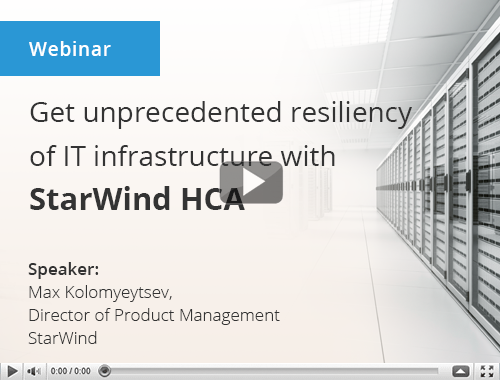StarWind primarily focuses on flexibility and resiliency of IT infrastructure in its hyper-converged solutions. In 2009 StarWind released its first HyperConverged storage solution. In 2015 the company started releasing hardware products including StarWind HyperConverged Appliance.
StarWind HyperConverged Appliance is built using best of breed components. It utilizes reliable and fast Intel CPUs and Flash, Mellanox networking equipment and StarWind cloud gateway for secure and transparent tiering or replication to any cloud service provider. For software, standard hypervisors are used like VMware vSphere, Microsoft HyperV and Veeam Availability Suite is added to provide reliable disaster recovery. For storage management, StarWind HyperConverged Appliance utilizes StarWind Virtual SAN as data mover or VMware vSan, or Microsoft S2D.
StarWind HyperConverged Appliance focuses on smaller businesses who lack simplicity, backup or centralized storage and don’t have budgets to go for Enterprise-level solutions. StarWind Hyperconverged Appliance is fully self-sustained and needs just two nodes to complete a highly available cluster. It can scale up or scale out thus, adding more storage or compute independently. It is easily integrated into existing or new environments.
StarWind HyperConverged Appliance availability is based on its Grid Architecture where every node in the cluster is interconnected with the others. It keeps at least 2 or 3 copies of VM or application in the cluster. Such architecture allows high performance as VM has at least 2-3 nodes to run on and maintain data locality. StarWind HyperConverged Appliance allows losing 50% of the infrastructure without losing the cluster.
StarWind also provides very fast and resilient StarWind Storage Appliance when dedicated storage for big data is needed. It integrates with existing StarWind HyperConverged Appliance nodes in the same cluster without any licensing problems. Storage Appliance is a unified storage array supporting all modern protocols like NFS, VVol, iSCSI and the RDMA-enabled protocols like iSER, SMB Direct, and NVMf.
To accomplish 3-2-1-0 Rule and store all backups and cold data separately StarWind provides StarWind Backup Appliance.
StarWind also delivers fast and single point of support for the entire stack.
Altogether appliances provide the following features: Fault tolerance, Unified Storage, Scale up, Deduplication and Compression, Snapshot tiering and Cloud storage tiering.


